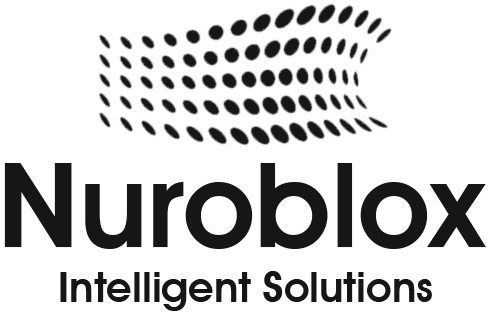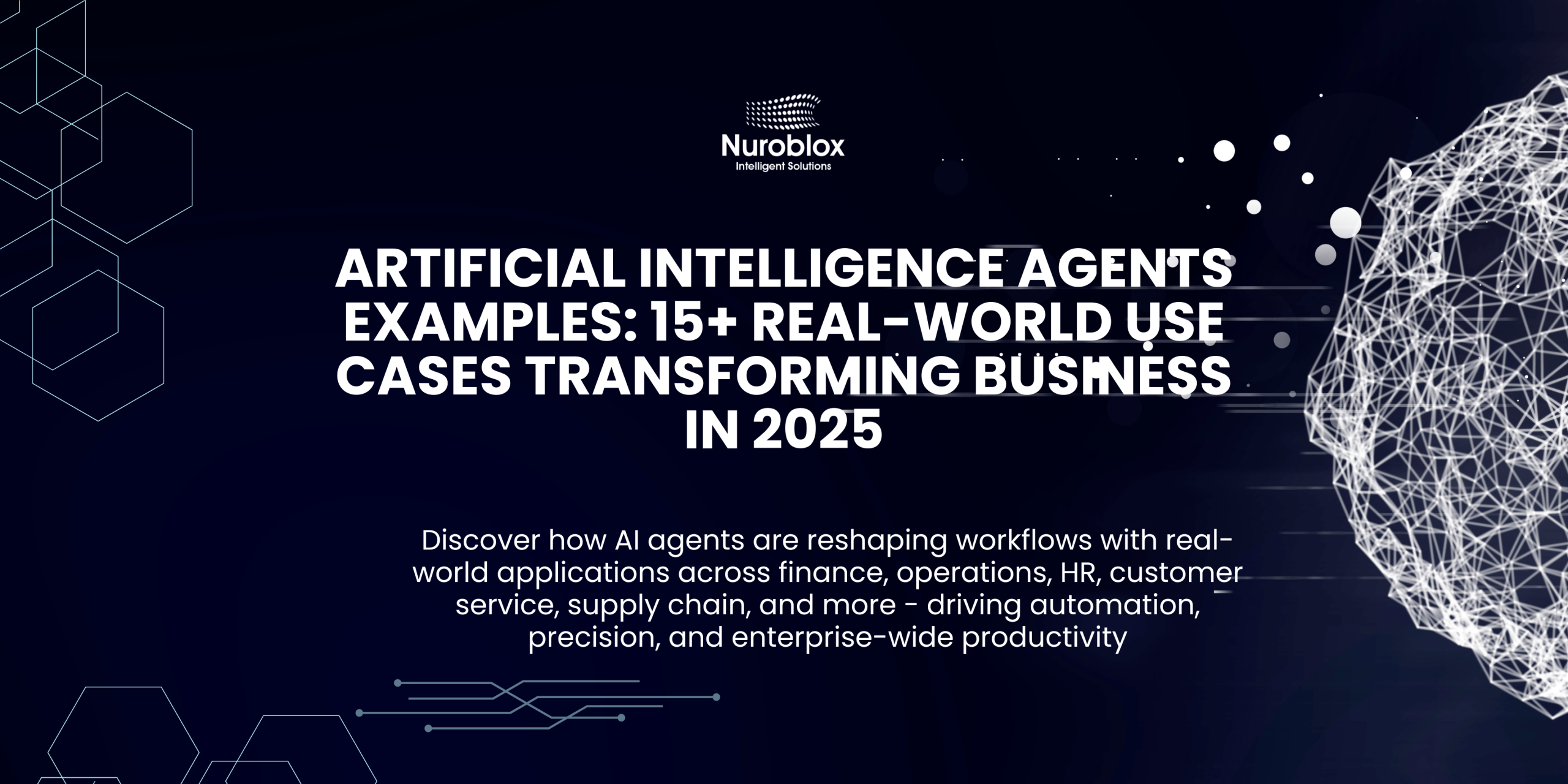Artificial Intelligence Agents Examples: 15+ Real-World Use Cases Transforming Business in 2025
AI agents represent the next evolution in business automation, transforming how organizations operate across every industry vertical. These intelligent systems can reason, learn, and take autonomous actions to complete complex tasks without constant human supervision, enabling companies to reduce operational costs by up to 30% while improving decision-making speed. Understanding real-world artificial intelligence agents examples helps businesses identify automation opportunities and implement solutions that deliver measurable ROI.
Understanding Artificial Intelligence (AI) Agents
AI agents are software systems that use artificial intelligence to pursue goals and complete tasks autonomously on behalf of users. Unlike traditional automation that follows rigid, pre-defined rules, AI agents adapt to changing circumstances and handle nuanced business scenarios with minimal supervision. These intelligent systems demonstrate reasoning capabilities, planning abilities, and memory retention that enable them to operate independently.
The key characteristics that distinguish effective AI agents include autonomy in performing tasks without requiring constant human direction, responsiveness to environmental changes and unexpected scenarios, goal orientation that maintains focus on predefined objectives, continuous learning through experience and pattern recognition, and seamless integration capability with existing enterprise systems. Organizations implementing agentic AI systems report improved efficiency, faster task completion, and the ability to reallocate human talent to strategic initiatives.
Customer Service Artificial Intelligence Agents
Customer support automation represents one of the most visible and impactful applications of artificial intelligence agents. Intelligent agents field customer inquiries, resolve common issues, access real-time information, and escalate complex problems to human specialists without experiencing the fatigue that affects human representatives. Banks report 60% reduction in support ticket volume when deploying agentic systems alongside traditional chatbots.
Modern autonomous AI agents can serve as the first line of support, capable of fully resolving high volumes of common customer requests without human oversight. These agents handle tasks such as processing refunds and returns, updating customer account information and preferences, resetting passwords and managing account access, and providing real-time order status and tracking updates. By automating routine tasks, AI agents provide instant, 24/7 resolutions for customers while freeing human agents to focus on more complex, high-value interactions.
Intelligent Ticket Management
When an issue is too complex for full automation, AI agents function as intelligent dispatchers that automatically analyze incoming tickets to determine urgency and subject matter. They route tickets to the human agent or department with the right expertise and provide complete summaries of customer issues and steps already taken, ensuring seamless transitions without forcing customers to repeat themselves. Healthcare patient support systems using autonomous medical assistance achieve significant increases in first contact resolution in patient care and medical guidance.
Virtual Assistant Examples
Virtual assistants powered by natural language processing represent the most familiar artificial intelligence agents examples to the general public. These intelligent personal assistants understand and process human language to perform tasks like setting reminders and managing emails while learning from user interactions to become more personalized and effective over time.
Siri, one of the first mainstream virtual assistants, is integrated into Apple devices including iPhones, iPads, Macs, and the Apple Watch. Siri helps with various tasks like making calls, sending texts, setting reminders, providing directions, and answering general knowledge questions. Alexa, available on Amazon Echo devices and other Alexa-enabled products, plays music, controls smart home devices, makes shopping lists, and provides news updates.
Google Assistant excels in pulling information from the web, scheduling events, managing smart home products, and facilitating real-time translation. Its deep integration with Google’s services makes it particularly powerful for tasks involving maps, YouTube, and search functionalities. These model-based reflex agents maintain an internal model for decision-making and use memory of previous interactions to provide contextually relevant responses.
Sales and Marketing AI Agents
AI sales agents are transforming sales and marketing processes by building lead lists, sending personalized communications, qualifying leads often more effectively than humans, strategizing and executing marketing campaigns, and analyzing competitor activities. Marketing and sales teams leverage no-code AI to gain competitive edges through AI workers that automatically enrich new leads in CRM systems with firmographic data.
These intelligent agents generate SEO-optimized blog posts and social media content that aligns with brand voice and respond to customer mentions on social media in real-time. One local marketing agency automated client reporting using no-code tools, saving hours of manual work each week and allowing teams to focus on creative strategy and client engagement. Marketing automation agents enable personalized lead nurturing with content recommendations, engagement tracking, and conversion optimization based on behavioral patterns.
E-commerce AI agents place orders, provide shipping updates, and give personalized product suggestions to users, while intelligent shopping assistance and order management reduce operational complexity and improve customer satisfaction. Lead generation agents chat, qualify leads, and book meetings, demonstrating how AI agents can handle the entire front-end sales process autonomously.
Human Resources Automation Agents
Human resources workflows benefit significantly from autonomous agents managing recruiting, onboarding, and employee records. From screening resumes and scheduling interviews to processing employment documentation and delivering personalized training recommendations, these agents streamline time-intensive HR functions while improving candidate experience and ensuring regulatory compliance.
HR teams deploy AI to analyze resumes for role-fit, rank candidates based on custom criteria, schedule interviews, and generate personalized onboarding plans. This automation not only accelerates time-to-hire but also helps reduce unconscious bias in the screening process, leading to more diverse and qualified workforces. A healthcare startup that automated patient scheduling and follow-ups saw significant improvements in both patient satisfaction and operational efficiency.
HR onboarding agents facilitate efficient employee onboarding through automated documentation processing, policy guidance, and personalized training recommendations. These goal-based agents make decisions by evaluating future outcomes and selecting actions that achieve specific organizational objectives.
Supply Chain and Logistics Agents
Supply chain optimization leverages agentic AI for demand forecasting, inventory management, and vendor coordination. These agents analyze historical patterns, market trends, and real-time inventory levels to recommend procurement actions, preventing both stockouts and excess inventory. During disruptions, they dynamically reroute shipments and identify alternative suppliers, demonstrating adaptive decision-making capabilities.
In supply chain management, agents represent various stakeholders like suppliers, manufacturers, distributors, and retailers. These multi-agent systems coordinate to optimize supply chain processes from procurement to delivery, ensuring efficiency and reducing costs. Small retailers implementing inventory AI that predicts demand and triggers orders report 20% sales increases and reduced out-of-stock events.
Retail operations benefit from intelligent agents that check inventory levels, generate reorder alerts, and optimize logistics. These utility-based agents evaluate potential actions based on expected utility, balancing multiple factors to make optimal decisions in complex environments.
Financial Services AI Agents
Financial services automation relies heavily on AI agents for transaction monitoring, fraud detection, compliance verification, and automated reporting to protect business interests. AI agents handling banking inquiries and financial transactions demonstrate 73% transfer rate improvement in service efficiency. These agents analyze vast amounts of transactional data in real-time to streamline fraud detection, risk assessment, and credit scoring.
Financial agents operate as utility-based systems that excel in complex decision-making environments with multiple potential outcomes, balancing different risks to make investment decisions and weighing side effects of various treatment options. The automation ensures faster processing while maintaining accuracy and regulatory compliance standards.
Finance and banking sectors deploy AI agents that automate loan application processing by collecting documents, identifying missing information, and coordinating with applicants throughout the process. These agents handle invoice matching, expense approvals, and fraud alerts, resulting in fewer errors and improved compliance.
Manufacturing and Robotics
Manufacturing environments utilize various embodied agents like software controlling physical systems to achieve real-world impact through end-to-end automation. Surgical robots like the da Vinci Surgical System assist surgeons in performing precise and minimally invasive procedures, extending surgeon capabilities rather than operating autonomously. These AI agents excel in high-stakes, precision-required environments.
Agricultural robots are deployed throughout the agricultural cycle, from planting seeds to harvesting crops to monitoring field conditions. These AI agents increase productivity since machines can more easily plant thousands of seeds than human workers. Service robots operate everywhere from robotic vacuum cleaners to hotel information providers to goods delivery systems at various establishments.
Autonomous swarm robotics deploys groups of robots where each robotic agent operates semi-independently but coordinates with other AI agents to cover larger areas, share sensory data, or collaboratively move objects. This approach proves particularly useful in challenging environments like collapsed buildings or planetary surfaces where teamwork among large AI systems achieves more than individual agents.
Autonomous Vehicles
Self-driving cars represent the most complex application of AI agents, combining multiple agent types including utility-based agents for decision-making, goal-based agents for navigation, model-based reflex agents for real-time responses, and learning agents for improving performance over time. Companies like Waymo are at the forefront of this technology, with self-driving cars already operating in cities like Phoenix, San Francisco, and Los Angeles.
These autonomous vehicles demonstrate the integration of various AI agent capabilities into unified systems that perceive environments, make decisions, and execute actions safely. The technology represents a convergence of artificial intelligence, robotics, and sensor technologies working together to achieve complex transportation objectives.
Data Processing and Analytics Agents
Data processing and analytics operations scale dramatically with agentic systems that extract data from diverse sources, clean and standardize information, detect anomalies, and generate actionable insights without human intervention. These agents enable analysts to focus on strategic interpretation rather than data preparation tasks.
Learning agents adapt and improve based on experience, continuously refining their performance as they process more data. This continuous learning mechanism allows agents to recognize changing patterns and automatically adjust approaches, remaining effective throughout extended deployments as business processes evolve.
Simple Reflex Agent Examples
Simple reflex agents react to current environments using predefined condition-action rules, lacking memory and adaptability but offering fast, predictable, and inexpensive operation. Thermostats represent classic examples, cranking heat up at 6pm in winter or turning on AC at noon in summer based on simple temperature thresholds. These agents demonstrate limited intelligence but serve specific purposes effectively.
Automatic doors function as simple reflex agents that sense humans approaching and open, demonstrating beautifully simple AI agent functionality. These threshold alert systems prove that not all AI agents require complex reasoning. Sometimes simple condition-action pairs suffice for specific applications.
IT Service Management Agents
IT service management benefits from AI agents that streamline ticketing and troubleshooting processes with automated diagnostics, guided resolution, and proactive system monitoring. Technical support resolution achieves 85% reduction in staffing costs while maintaining superior service quality through advanced troubleshooting and problem-solving capabilities.
These agents for technical troubleshooting guide customers through structured diagnostic procedures like for instance, when customers report internet outages, AI agents walk them through steps like rebooting routers and checking cable connections to resolve problems autonomously. IT agents eliminate the need for human intervention in routine technical activities while ensuring consistent service delivery.
Advanced Capabilities – Multi-Agent Systems
Multi-agent collaboration represents a frontier capability where sophisticated systems deploy agent teams in which different specialized agents handle distinct components of complex workflows, communicating and coordinating autonomously. This mimics how human teams organize work, enabling handling of intricate business processes that exceed individual agent capabilities.
Real-time decision intelligence empowers agents to analyze business contexts and make nuanced decisions, evaluating multiple factors, considering business priorities, and executing sophisticated decisions that humans would typically reserve for senior staff. Continuous learning mechanisms allow agents to improve performance through experience rather than degrading over time as business processes evolve.

The autonomous agents landscape continues evolving rapidly with industry trends including increased autonomy and reduced human oversight as organizations gain confidence and agents demonstrate reliability across diverse scenarios. Expanded industry-specific applications tailored to healthcare, legal, financial, and manufacturing sectors incorporate domain-specific knowledge and compliance requirements.
Improved agent collaboration ecosystems enable swarms of specialized agents to orchestrate complex multi-stage workflows autonomously while enhanced natural language understanding enables agents to extract context from unstructured communications and documents with increasing sophistication. Modern AI agents increasingly incorporate advanced reasoning and decision-making capabilities through generative AI integration, enabling agents to draft communications, create customized reports, and generate strategic recommendations.
Implementing AI Agents in Your Organization
Modern automation platforms like NuroStudio combine RPA capabilities with intelligent automation features including machine learning, document understanding, and natural language processing. Leading solutions enable organizations to build and deploy autonomous agents without extensive coding, accelerating time-to-value.
Organizations should establish clear parameters defining which decisions agents make autonomously versus scenarios requiring human review, with initial deployments often including monitoring periods where agents operate with enhanced logging and override capabilities. This approach builds organizational confidence before transitioning to full autonomy.
Ready to transform your business operations with AI agents? Explore how AI agents and agentic automation can revolutionize your workflows, reduce costs, and free your team to focus on strategic initiatives that drive growth.


